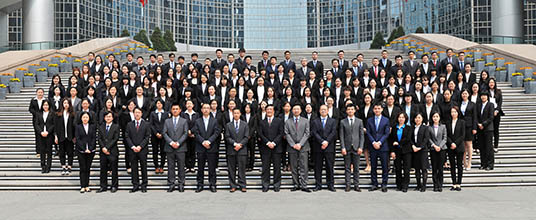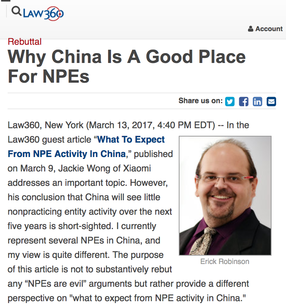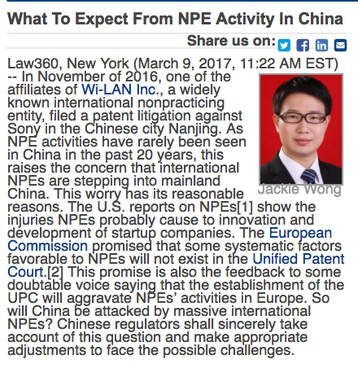|
Today, we have a guest post from my colleague at Beijing East IP, Austin Chang. Austin provides a summary of the IWNCOMM v. SONY standard-essential patent decision by the Beijing IP Court (IWNCOMM v. Sony (2015) Jing Zhi Min Chu Zi No. 1194).  Austin Chang Austin Chang Plaintiff Xi’an Xi Dian Jie Tong Radio Network Co. (“IWNCOMM”) filed a patent infringement action against Sony Mobile Communication (China) Co., Ltd. (“Sony”) on July 2, 2015 for infringing IWNCOMM’s standard-essential patent (“SEP”) No. ZL02139508.X for a mandatory national WAPI standard. According to the judgment, Sony was ordered to (1) immediately cease infringement of IWNCOMM’s SEP found in 35 of Sony’s mobile handsets, (2) pay damages of RMB8.62 million (approximately USD1.25 million), and (3) pay reasonable litigation costs of RMB474,194 (around USD69,000). This is a first instance decision and is appealable to the Beijing High Court within 15 days for IWNCOMM (as a domestic entity) and within30 days for Sony (as a foreign entity) upon receipt of the decision. We will continue to provide updates regarding any further developments. Please see below for the summary of the ruling:
 I will be speaking next week on open source licensing in Beijing at a conference jointly sponsored by the US Patent Office (USPTO) and the Ministry of Commerce (MofCOM) of the Government of China. The USPTO and MofCOM are jointly sponsoring a program on cross-border technology licensing on March 28 in Beijing at Renmin University’s law school. A draft agenda is available here. The USPTO/MofCOM program is intended to provide an opportunity to discuss cross-border IP licensing, including China’s Technology Import Export Regulation (“TIER”) and its impact on US technology collaboration and licensing. The program builds upon prior programs with SIPO that explored similar topics. Please email Ms. Liu Jia at [email protected] to RSVP as soon as possible. Thanks to my colleague Mark Cohen of the ChinaIPR.com blog for recommending me to speak! I have had a number of inquiries regarding joining Beijing East IP, so I am pasting below the press release. If anyone would like additional information or would just like to chat, email me at [email protected]! Beijing, P.R. China (March 15, 2017) Beijing East IP, the top intellectual property firm in China, has hired Erick Robinson as Director of Patent Litigation. Mr. Robinson was most recently Chief Patent Counsel Asia Pacific at Rouse International in Beijing and Shanghai. He will be based in Beijing.
Mr. Robinson previously served as Director of Patents for Qualcomm in Asia, where he managed a broad range of IP issues ranging from patent drafting, prosecution, licensing, and litigation, to regulatory, policy, and antitrust matters. He also managed open source issues for Qualcomm Atheros, and created, implemented, and enforced open source protocols. Before Qualcomm, Erick managed patent and open source matters for Red Hat. Mr. Robinson is an experienced U.S. patent attorney and trial lawyer with a technical background in computer science and physics, as well as biotechnology. He is a trusted authority on patent and antitrust law in China, and has been selected as one of the Leading 300 IP Strategists Worldwide by IAM for the past two years. The author of the influential ChinaPatentBlog.com as well as numerous articles on Chinese patent litigation, Mr. Robinson is frequently quoted in the Wall Street Journal, Financial Times, Intellectual Asset Management, and other publications on Chinese patent and antitrust issues. Erick began his legal career at a Wall Street law firm negotiating and drafting technology agreements, and then moved to Texas, where he managed and tried patent cases for top U.S. law firms Weil Gotshal and McKool Smith. During his time in Texas, he managed bet-the-business patent cases on both the plaintiff and defendant side for Fortune 100 companies to sole inventors. “I am excited and honored to join such a prestigious firm as Beijing East IP,” Mr. Robinson said. “This is the best IP firm in China, and they aggressive, connected, and talented. I am especially looking forward to working with Dr. Lulin Gao, the father of the Chinese patent system.” “We are delighted to welcome Erick to our firm and entrust him with the responsibility to further strengthen firm’s litigation practice,” said Dr. Lulin Gao, founder and Chairman at Beijing East IP, a 2016 inductee into the IP Hall of Fame, and founding commissioner of SIPO. “We are excited to see this innovative combination of a senior US litigator and a well-established and connected China IP full service firm. We look forward to creation of the best litigation practice in China on patent and antitrust,” said Mr. Dragon Wang, Vice President at Beijing East IP.  I am excited and proud to announce that I have changed firms. Today I officially joined Beijing East IP as Director of Patent Litigation. I will be based in Beijing. The firm is headed by Dr. Lulin Gao, the father of the Chinese patent system and the first commissioner of the Chinese Patent Office (SIPO). Dr. Gao is the most connected person in IP in China. Beijing East has over 250 IP specialists, and a vast group of technical experts, including many top trial lawyers appointed by the Supreme Court for Patent Litigation. No other firm has the technical resources, legal expertise, and relationships of Beijing East IP. It is an honor to be associated with such an impressive group of lawyers and technical experts. Beijing East IP is the best IP firm in China, and they are aggressive, connected, and talented. I am looking forward to working with this amazingly experienced and knowledgeable team. You can email me at my new firm at [email protected].  My IP Law360 Article is Online My IP Law360 Article is Online My response to the recent IP Law360 article by Xiaomi's Jackie Wong is now online. In my rebuttal article on IP Law360, I explain the following:
Let me know what you think of the article! Email me at [email protected] or contact me on LinkedIn!
|
Welcome to the China Patent Blog by Erick Robinson. Erick Robinson's China Patent Blog discusses China's patent system and China's surprisingly effective procedures for enforcing patents. China is leading the world in growth in many areas. Patents are among them. So come along with Erick Robinson while he provides a map to the complicated and mysterious world of patents and patent litigation in China.
AuthorErick Robinson is an experienced American trial lawyer and U.S. patent attorney formerly based in Beijing and now based in Texas. He is a Patent Litigation Partner and Co-Chair of the Intellectual Property Practice at Spencer Fane LLP, where he manages patent litigation, licensing, and prosecution in China and the US. Categories
All
Archives
February 2021
Disclaimer: The ideas and opinions at ChinaPatentBlog.com are my own as of the time of posting, have not been vetted with my firm or its clients, and do not necessarily represent the positions of the firm, its lawyers, or any of its clients. None of these posts is intended as legal advice and if you need a lawyer, you should hire one. Nothing in this blog creates an attorney-client relationship. If you make a comment on the post, the comment will become public and beyond your control to change or remove it. |








 RSS Feed
RSS Feed